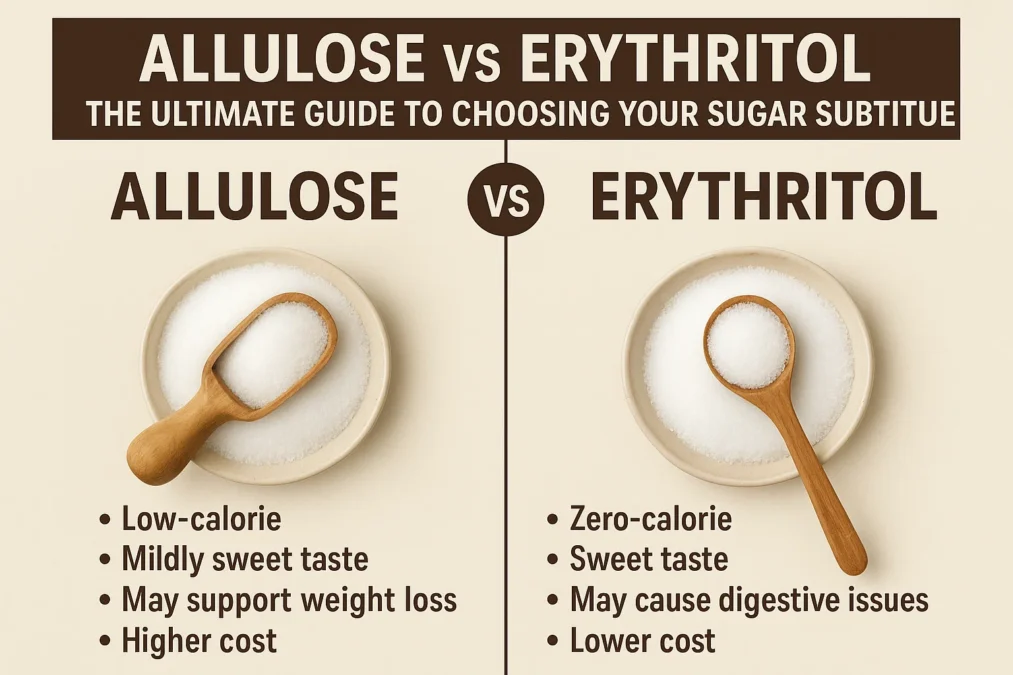Navigating the world of sugar alternatives can feel like walking through a sweet, confusing labyrinth. You want to cut back on sugar, but you don’t want to sacrifice the joy of a delicious cookie or a perfectly sweetened iced coffee. For years, erythritol has been a reigning champion in the keto and low-carb communities. But recently, a new contender has stepped into the spotlight: allulose. Both promise the sweetness of sugar without the calories or blood sugar spike, but they are far from identical. Understanding the nuances between allulose vs erythritol is key to making the right choice for your health goals, your recipes, and your taste buds.
This isn’t just about which one is sweeter; it’s a deep dive into their chemical structures, how your body handles them, and how they perform in your kitchen. We’ll peel back the layers on taste, digestive tolerance, cooking properties, and even the latest scientific research. Whether you’re a seasoned keto veteran or just starting your journey towards a lower-sugar lifestyle, this comprehensive guide will equip you with everything you need to know to confidently choose between these two popular sweeteners. Let’s settle the debate of allulose vs erythritol once and for all.
What is Erythritol Anyway?
To understand the allulose vs erythritol debate, we need to start with a clear picture of each contender. Erythritol is a type of sugar alcohol, or polyol, that occurs naturally in small amounts in foods like pears, melons, grapes, and even mushrooms. However, the erythritol you buy in a bag at the store is typically produced through a fermentation process. A natural sugar from corn is fermented by a type of yeast, which converts it into erythritol. This process makes it widely available and relatively inexpensive.
Erythritol has become a staple in the world of sugar-free products for several key reasons. First and foremost, it contains almost zero calories. While table sugar packs about four calories per gram, erythritol comes in at a mere 0.24 calories per gram. Furthermore, it has a negligible effect on blood glucose and insulin levels, making it a fantastic option for people with diabetes, those on a ketogenic diet, or anyone watching their carbohydrate intake. Its chemical structure allows it to be absorbed into the bloodstream in the small intestine and then excreted unchanged in the urine, which is why it bypasses the metabolic processes that cause other sugars to contribute calories.
What is Allulose and Where Does It Come From?
Allulose, often described as a “rare sugar,” is the newer kid on the block that has generated significant excitement. Chemically, it’s what’s known as an epimer of fructose. In simpler terms, it’s a monosaccharide, or single sugar molecule, that has the same chemical formula as fructose but is arranged slightly differently. This subtle difference in atomic arrangement is what makes allulose so special. Your body recognizes it enough to perceive its sweet taste, but it lacks the enzymes to metabolize it effectively, so it provides minimal calories and doesn’t raise blood sugar.
While allulose is found naturally in small quantities in wheat, figs, and raisins, it’s not abundant enough in nature to make large-scale harvesting feasible. Thanks to modern food science, we can now produce it commercially through an enzymatic process that starts with corn. The process involves converting the fructose from corn into allulose. This has made it more accessible, though it is generally still more expensive than erythritol. The FDA has acknowledged it as generally recognized as safe (GRAS), and it’s gaining global acceptance as a unique and beneficial sweetening ingredient.
The Sweetness Showdown: A Matter of Taste
When you’re considering allulose vs erythritol for your morning coffee or your favorite dessert recipe, taste is paramount. Erythritol is typically rated at about 60-70% as sweet as table sugar. This means you need to use a bit more of it to achieve the same level of sweetness you’d get from sugar, which is an important adjustment to make in recipes. One of the most noted characteristics of erythritol is its cooling sensation. This cooling effect, similar to what you experience with mint, is a common trait of sugar alcohols and is caused by an endothermic reaction—it absorbs heat as it dissolves in your saliva.
This cooling mouthfeel can be a desirable trait in things like mint gum, ice cream, or refreshing beverages. However, it can be distracting or unpleasant in baked goods like breads or cookies, where a warm, rich sweetness is expected. Some people are also sensitive to a slight aftertaste with erythritol, often described as mildly metallic or chemical, though many find it to be one of the cleanest-tasting sugar alcohols available. Allulose, on the other hand, has a sweetness profile that is much closer to that of real sugar. It is generally considered to be about 70% as sweet as sucrose, putting it in a very similar range to erythritol.
Where allulose truly shines in the allulose vs erythritol taste test is its complete lack of cooling effect and its remarkably clean aftertaste. It mimics the flavor and mouthfeel of sugar almost perfectly, without any of the odd chemical or minty notes. This makes it exceptionally good for applications where you want a pure, undistorted sweet flavor. It behaves like sugar on your palate, providing a round, full sweetness that doesn’t leave a strange sensation behind. For many people seeking the most authentic sugar replica, allulose wins the taste category hands down.
How Your Body Handles Them: Digestion and Side Effects
The digestive experience is perhaps one of the most significant differentiators in the allulose vs erythritol conversation. Erythritol has a major advantage over other sugar alcohols like maltitol or xylitol when it comes to digestive distress. Because approximately 90% of ingested erythritol is absorbed into the bloodstream and excreted in the urine, only a small amount reaches the large intestine. This means it’s far less likely to cause the gas, bloating, and laxative effects that are notorious with other sugar alcohols.
However, this doesn’t mean erythritol is entirely free of side effects. When consumed in large quantities, typically over 50 grams or so for most adults, the portion that isn’t absorbed can draw water into the colon and ferment, leading to those very same digestive issues. Individual tolerance varies greatly, so it’s always best to start with a small amount and see how your body reacts. Allulose takes a different path through your digestive system. It is absorbed in the small intestine but is not metabolized for energy, and is then excreted via the kidneys in the urine, much like erythritol.
Due to this similar excretion pathway, allulose is also known for being very gentle on the stomach, especially when compared to other sweeteners. Most people can consume relatively large amounts of allulose without experiencing any significant gas or bloating. Some very sensitive individuals might notice mild effects if they consume a huge dose all at once, but overall, its gastrointestinal tolerance is considered excellent. In the allulose vs erythritol battle for gut comfort, it’s a very close race, with both being well-tolerated by the majority of people, especially when compared to other sugar substitutes.
The Baking and Cooking Performance
If you love to bake, the functional properties in the kitchen are a critical part of the allulose vs erythritol decision. Erythritol has some fantastic baking qualities. It is heat-stable, meaning it won’t break down or lose its sweetness when exposed to high temperatures in the oven. It’s also not hygroscopic, which means it doesn’t absorb moisture from the air. This is great for creating crispy cookies or crunchy toppings. However, this lack of hygroscopicity can also be a drawback, sometimes leading to baked goods that are drier or more crumbly than their sugar-based counterparts.
One of the biggest challenges with erythritol in baking is that it doesn’t caramelize or contribute to browning like sugar does. It also has a tendency to recrystallize when it cools, which can create a slightly gritty or sandy texture in some frostings and candies. This is why you often see erythritol blended with other sweeteners or fibers in commercial keto products—to counteract this crystallization and improve the mouthfeel. Allulose, by contrast, behaves in a way that is almost magical for a low-calorie sweetener. It caramelizes beautifully when heated, just like real sugar.
This caramelization property is a game-changer for creating chewy cookies, rich caramel sauces, and flans with a perfect golden top. Allulose is also hygroscopic, meaning it retains moisture. This results in baked goods that stay softer and more moist for longer, preventing that dreaded keto-bake dryness. It dissolves easily and doesn’t recrystallize, making it ideal for silky smooth ice creams, syrups, and glazes. The one potential downside is that because it browns so easily, you may need to slightly adjust your baking times and temperatures to prevent over-browning.
The Health Impact: Blood Sugar, Dental Health, and More
For most people exploring the allulose vs erythritol question, the impact on health is the primary motivator. Let’s start with blood sugar. Erythritol has a glycemic index of zero. It does not raise blood sugar or insulin levels at all, which is why it’s a cornerstone of diabetic and ketogenic diets. Its non-cariogenic nature is another huge benefit, meaning it doesn’t feed the bacteria in your mouth that cause cavities. In fact, some studies suggest it might even help prevent biofilm formation on teeth.
The conversation around erythritol took a interesting turn in early 2023 when a study was published linking high blood levels of erythritol to an increased risk of cardiovascular events like heart attack and stroke. It is crucial to understand the context of this study. The researchers noted that the individuals with high erythritol levels likely produced it endogenously—meaning their own bodies were making it as part of their metabolic dysfunction. It was a correlation, not necessarily a causation from dietary intake. Furthermore, the amounts given to participants in the intervention part of the study were far higher than what the average person would consume. Most regulatory bodies around the world still consider erythritol safe for consumption.
Allulose also boasts an impressive health profile. Like erythritol, it has a negligible effect on blood glucose and insulin levels, making it equally suitable for low-carb and diabetic diets. It, too, is non-cariogenic and does not promote tooth decay. Some emerging research has suggested even more potential benefits from allulose. Studies indicate that it may help with weight management by slightly increasing fat burning and reducing body fat accumulation. It might also have a protective effect on the liver.
One fascinating area of research is allulose’s potential role as a “prebiotic-like” substance, though the science is still young. It’s important to note that while both sweeteners are excellent for metabolic health, they are not magic bullets. They are tools to be used as part of a balanced, whole-foods-based diet. The choice between allulose vs erythritol from a pure health perspective may come down to individual response and any specific health conditions, but both are generally regarded as safe and beneficial alternatives to sugar.
Cost and Availability: The Practical Realities
When you’re standing in the grocery store aisle, the price tag often becomes a deciding factor. In the allulose vs erythritol cost comparison, erythritol is almost always the more budget-friendly option. Its production through fermentation is an efficient and well-established process, which has driven its cost down over the years. You can find large bags of erythritol at most major supermarkets, health food stores, and online retailers for a reasonable price, making it an economical choice for everyday use.
Allulose, while becoming more common, is still significantly more expensive. The enzymatic conversion process used to create it is more complex and less efficient than the fermentation used for erythritol, which is reflected in the retail price. A bag of allulose can often cost two to three times more than an equivalent bag of erythritol. Its availability is also more limited. You’re more likely to find it in specialty health food stores or through online retailers than in your local conventional supermarket, though this is changing rapidly as its popularity grows.
For many consumers, this practical consideration is the final word in the allulose vs erythritol debate. If you do a lot of baking and sweetening, the cost of using allulose exclusively can add up quickly. This is why many people choose to use them strategically—using erythritol for bulk sweetening in large recipes and reserving the more expensive allulose for applications where its unique browning and non-crystallizing properties are essential, like caramel or ice cream. Some also opt for pre-made blends that use both sweeteners to balance cost and performance.
Making the Right Choice for You
So, after all this analysis, which one should you choose in the great allulose vs erythritol debate? The answer, as with most things in nutrition, is that it depends on your personal priorities. If your primary concern is cost, digestive tolerance for large quantities, and you don’t mind the cooling sensation, then erythritol is a fantastic and reliable workhorse. It’s a proven sweetener that has helped millions of people reduce their sugar intake effectively. Its zero glycemic impact is undeniable, and its stability makes it a versatile ingredient.
If, however, you are seeking the most authentic sugar-like experience and are willing to pay a premium for it, allulose is likely your winner. Its ability to caramelize, its lack of aftertaste, and its moisture-retaining properties make it superior for many baking applications. It’s the best choice for creating classic desserts that taste and feel like the real thing, without the metabolic consequences of sugar. For people who are particularly sensitive to the cooling effect of erythritol, allulose offers a welcome alternative.
It’s also important to remember that you don’t necessarily have to choose one over the other. Many experienced low-carb bakers have found that using a blend of allulose and erythritol gives them the best of both worlds. The allulose provides the browning, moisture, and neutral taste, while the erythritol bulks up the sweetness and lowers the overall cost. Experimenting with different ratios can help you create a custom sweetener blend that perfectly suits your palate, your recipes, and your budget. The true winner in the allulose vs erythritol showdown is you, having more tools and knowledge to take control of your health without giving up on sweetness.
Greenshell Mussels vs Black Mussels: The Ultimate Seafood Showdown
Frequently Asked Questions
Can I use allulose and erythritol interchangeably in recipes?
While both are sweeteners, they are not a 1:1 swap due to their different chemical properties. Erythritol is about 70% as sweet as sugar and can recrystallize, while allulose is also 70% as sweet but caramelizes and retains moisture. Substituting one for the other can affect the texture, browning, and moisture content of your final product. It’s best to follow recipes specifically designed for the sweetener you are using, or experiment cautiously with small batches.
Which is better for keto diet, allulose or erythritol?
Both allulose and erythritol are excellent choices for a ketogenic diet as they have negligible impacts on blood sugar and insulin levels, which is crucial for maintaining ketosis. The choice between them often comes down to personal preference regarding taste and baking performance. Some people prefer allulose for its more sugar-like behavior, while others prefer erythritol for its cost-effectiveness and widespread availability.
Does allulose or erythritol cause digestive issues?
Both sweeteners are known for being much gentler on the digestive system than other sugar alcohols like maltitol. Erythritol is mostly absorbed and excreted, so it causes few issues unless consumed in very large amounts. Allulose is also well-tolerated by most people. However, individual sensitivity varies, and introducing any new sweetener slowly is always recommended to see how your body responds.
Why is allulose so much more expensive than erythritol?
The production process for allulose is more complex and less efficient than the fermentation process used for erythritol. Creating allulose requires a specific enzymatic conversion, which is currently more costly. As demand for allulose grows and production methods potentially improve, the price may become more competitive with erythritol over time.
Are there any health risks associated with allulose or erythritol?
Both sweeteners are generally recognized as safe (GRAS) by the FDA. A recent study raised questions about erythritol and cardiovascular risk, but it primarily identified a correlation with naturally produced erythritol in the body, not necessarily a causation from dietary intake. For the vast majority of people, consuming typical amounts of either sweetener is considered safe. As with any food, moderation is key.
Conclusion
The journey through the world of allulose vs erythritol reveals that there is no single, universal “best” sweetener. Each possesses unique strengths and weaknesses that make it better suited for different people and different purposes. Erythritol stands as a reliable, cost-effective, and proven sugar alcohol that has earned its place in pantries worldwide. Its zero glycemic impact and high digestive tolerance make it a powerful tool for sugar reduction. Allulose emerges as the artisanal contender, mimicking sugar’s taste and functional properties with remarkable accuracy, from caramelization to moisture retention, making it a dream for discerning bakers and foodies.
Your ideal choice hinges on what you value most. If budget and a proven track record are your guides, erythritol is an excellent choice. If achieving the most authentic sugar-like experience in your cooking and baking is your goal, and cost is a secondary concern, then allulose is likely your champion. For many, the most sophisticated approach is not to choose a side, but to understand the properties of both and use them strategically, either separately or in a blend, to create delicious, satisfying, and health-conscious foods. Ultimately, the availability of such high-quality options is a victory for anyone looking to enjoy sweetness without compromise.



